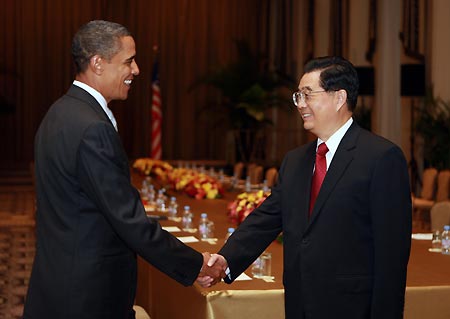 |
|
Chinese President Hu Jintao (R) meets his US counterpart Barack Obama in New York, the United States, Sept. 22, 2009. [Ju Peng/Xinhua]
|
Hu put forward four propositions on furthering bilateral ties.
First, he said, the two countries should maintain close top-level exchanges. He said he is looking forward to Obama's visit to China in November and that he is convinced the visit will be a success through joint efforts of both sides.
Secondly, the two sides should strive to do a good job in completing the follow-up work of the first China-US Strategic and Economic Dialogue held in July. Hu said the two sides should join hands to further promote exchanges and cooperation in combating the international financial crisis and in such areas as trade and economy, anti-terrorism, nuclear non-proliferation, law enforcement, energy, environment and culture.
Thirdly, Hu said the two countries should deepen coordination and cooperation on major regional and international issues. He said the two countries should push for a proper resolution to the regional issues relating to the Korean Peninsula, Iran and South Asia. Both sides should strengthen communications and coordination on the global issues of climate change, food security, global nuclear security and epidemic diseases, Hu said.
Fourthly, Hu said the two countries should step up cultural and people-to-people exchanges. The two sides should boost their cooperation in such areas as personnel exchanges, training of talents and language learning in efforts to consolidate the social basis of bilateral ties.
Noting the importance of expanding bilateral cultural exchanges, Obama said both governments should lend full support to people-to-people exchanges between the two countries.
Meanwhile, Hu emphasized that the two sides should respect and take care of each other's interests and concerns. He said issues related to Taiwan, Tibet and Xinjiang concern China's sovereignty and territorial integrity and national sentiment of the 1.3 billion Chinese people.
China attaches importance to the US side's reiteration of its commitment to adhering to the one-China policy and abiding by the three joint communiques, the Chinese president said. Hu expressed the wish that the US side would take real action to support the peaceful development of relations across the Taiwan Straits.
China appreciates the United States for its recognition of Tibet as a part of China and its stance on opposing "Tibet independence," Hu said. He expressed the hope that the US side would understand and respect China's concern on issues related to Tibet.
Hu also said the "July 5" riot in Urumqi, capital of China's Xinjiang Uygur Autonomous Region, is a serious, violent and criminal incident plotted and organized by the "three forces" from within and outside China. The president said he hopes the US understands and supports the measures that China has adopted to fight violent terrorist crimes, safeguard national unification and maintain social stability.
Hu called on the US to prevent the conducting of separatist activities against China in US territory.
Obama said on the Taiwan issue that the United States remains committed to the one-China policy. He said the US appreciates the ease of relations between the two sides of the Taiwan Straits, which it considers conducive to peace and stability in Asia.
Obama said the United States does not support "Tibet independence" and respects China's sovereignty and territorial integrity on issues related to Tibet and Xinjiang.
On issues of trade disputes, Hu said the recent US decision to impose special safeguard measures on tires imported from China contradicts the interests of both countries and anything of this kind should not happen again.
Under the current economic and financial situation, both China and the United States should stand firmer to oppose trade and investment protectionism, Hu said.
Hu said China is ready to work with the US to further expand mutually beneficial cooperation in trade and economic area. China, Hu said, is ready to properly handle friction through equal consultation in a bid to maintain a healthy and stable growth of China-US trade and economic ties.
On the issue of currency, Hu said China has maintained stability of the exchange rates of Renminbi (RMB) even when the economy was faced with difficulties since the outbreak of the international financial crisis, a move considered a contribution to the Asian and the global economy.
Obama said the United States supports free trade and focuses on further expanding trade and economic relations with China. He said the US is willing to resolve disputes in trade and economic areas through dialogue and consultation.
He expressed appreciation on China's efforts to expand domestic demand and maintain the stability of the RMB against the impact of the international financial crisis.
On climate change, Hu pointed out that it is a common challenge that requires joint response from the international community. Hu emphasized that the developed countries should continue to take the lead in reducing emissions after 2012, when the Kyoto Protocol expires, and provide assistance for the developing countries in tackling climate change.
China places great importance on the issue of climate change and has made active efforts to address it, Hu said.
Hu expressed the belief that under the joint effort of both sides, China and the United States will achieve more in cooperation on energy, environment and climate change.
China will adopt a positive and constructive attitude and play its due role in pushing for success of the Copenhagen conference, Hu said.
Obama also expressed the wish to strengthen bilateral cooperation on climate change, especially in the area of clean energy. He said clean energy cooperation could become an important pillar of bilateral links for advancing common interests of both countries and benefits of their people. He hopes the two countries work together for the success of the Copenhagen conference.
The presidents also exchanged views on situation in the Korean Peninsula and the nuclear issue of Iran.
(Xinhua News Agency September 23, 2009)